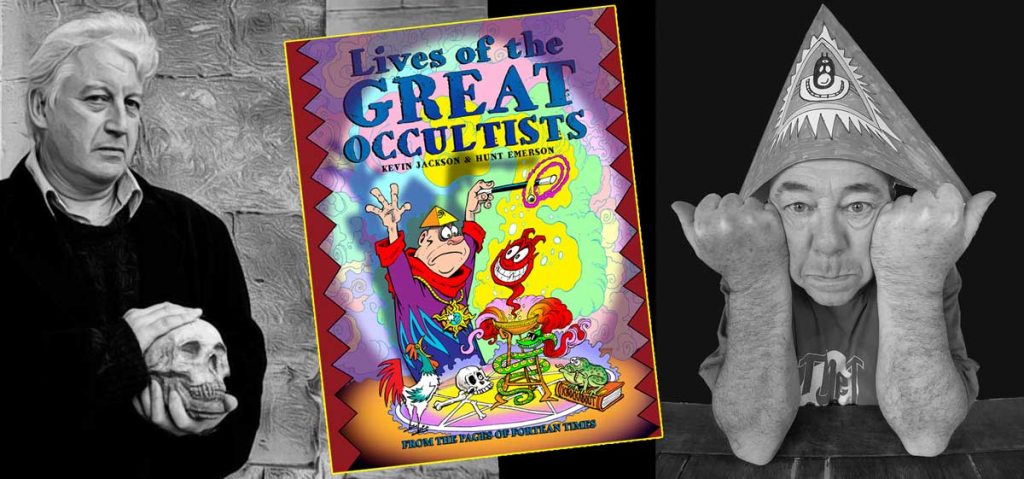
By Rory Milne
Although better known for solo creations Calculus Cat and Max Zillion, underground cartoonist Hunt Emerson has worked with many writers over his five decade career. His current collaborator is author Kevin Jackson, who Hunt describes as: “a renaissance man,” which is fair. For his part, Kevin singles Hunt out as: “the best cartoonist in England,” which is true. The pair’s latest book – Lives Of The Great Occultists – comes out this September, but Rory Milne discovers that, as with so many good stories, theirs begins at a party…
downthetubes: So if I start by asking how you met, and why you decided to work together?
Hunt Emerson: Knockabout used to have parties to launch books, and we had one to launch my Rime Of The Ancient Mariner, which was on a floating restaurant on the Thames. I had to dress up in 18th century gear, knee breeches and that, with an inflatable seagull around my neck that was meant to be an albatross! Kevin used to review for The Independent and other publications, so he got onto the list as an invitee. That was where I first met him, and then didn’t see him for some time after that until he got in touch with me about doing some work to do with John Ruskin. Then we also worked on other things, and we got on very well. We did things like D. H. Lawrence – Zombie Hunter and Dante’s Inferno, and then Kevin started writing some of the Fortean Times strips for me.
Kevin Jackson: We were just talking one day, and Hunt said: “I am absolutely stumped for ideas,” so I told him a story about how the American writer William Seabrook had met Aleister Crowley in New York. Crowley did this amazing stunt where he fell into step about twelve paces behind somebody, mimicked the guy’s step exactly and then deliberately stumbled, and then the guy in front went over as though he had been felled with an axe. So Hunt did that, and it went down well, so we said: “Well there’s quite a lot of other nutters out there that we could cover, it’s not just Crowley!”
Hunt: So Kevin started writing these “Lives Of The Great Occultists” and once he had got started on it he couldn’t stop. He just kept churning them out. Eventually there was as many as there are now – 40 or something like that. That was when we decided to do them as a book.
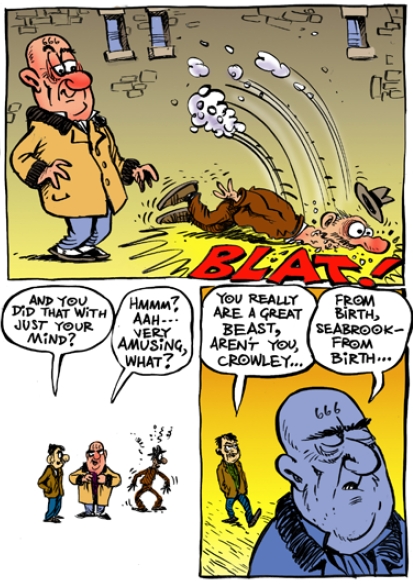
downthetubes: So what gave the pair of you the idea to make a series of strips about interesting historical figures who studied the occult?
Hunt: The occult is something Kevin’s always been interested in.
Kevin: It’s been a lifelong fascination. I wrote a project about Merlin when I was eight or nine – fortunately it hasn’t survived! But an interest in the occult has been running in parallel with all of my other interests, and it’s just because it’s not very reputable that I’ve never written about it. And of course comics are quite disreputable, so you can do anything you want there.
downthetubes: Yeah, I guess the bar is a lot lower for subject matter, and you can make it funny, which I guess helps.
Kevin: It helps if you’ve got Hunt to work with! [Laughs]
downthetubes: Ok, I also wanted to ask how concerned you are about putting out a book on a controversial topic like the occult?
Hunt: First of all they were done for Fortean Times, so we didn’t have the need to think about the greater public, but I don’t know. I mean, it’s not as if either of us actually believe in this, you know? [Laughs] And they’re such bizarre stories that it was down to finding humour in them and making them funny, and not worrying about the controversial aspect of it.
Kevin: In a way, if anyone made a stink about it I’d be delighted because it would get some publicity! But I’d find it very hard to think of anyone except a very fundamentalist Christian being upset by anything in it.
downthetubes: I suppose the obvious follow-up is to ask how you think Lives Of The Great Occultists will go down with conservative Americans?
Hunt: It’s interesting you ask, because I hadn’t thought about that. I should imagine if I was trying to push this in the American mainstream at all there would all sorts of problems coming up. But it’s unlikely to make much impact in that sort of way.
downthetubes: You reckon the typical right-wing American probably wouldn’t see the book?
Hunt: Very likely not, and they’re probably not looking at Fortean Times either.
downthetubes: Of course, there’s quite a wide following of the Fortean Times in the States, isn’t there?
Hunt: Yep.
downthetubes: Probably not too many conservative Americans read it, though?
Hunt: Let’s hope not! [Laughs]
downthetubes: So what was the division of labour between yourself and Kevin when it came to doing the strips?
Hunt: He writ’ ‘em and I drew ‘em!
downthetubes: As simple as that?
Hunt: Not exactly. Kevin would write me a script, but I would rearrange it – because I know more about making a comic than he does. They have their own particular rules and aesthetics for making things work as a story on the page. So he would come up with the information, and put down any ideas and jokes that he had. I would take a frame and spread it over two or three – and probably edit stuff out as well. There was never any aggravation about it, I’d send him the finished thing and he would roar with laughter at it! [Laughs]
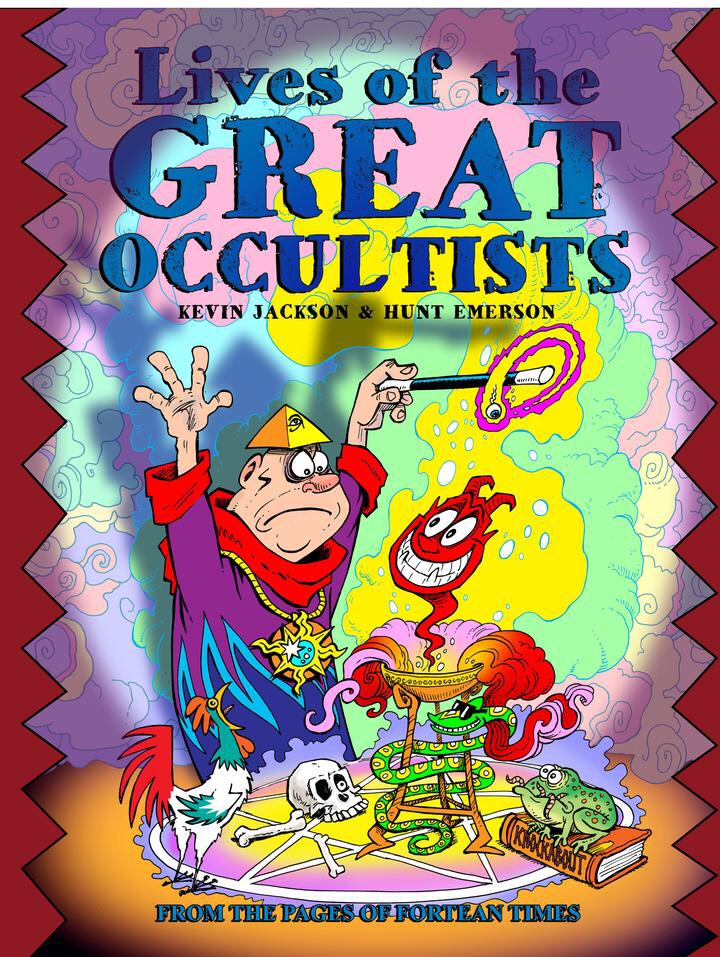
downthetubes: So how much of a struggle was it to squeeze the occultists’ lives into the available space?
Kevin: That is a very good question, and the answer is: not always easy. We could have done the entire book about Crowley and not run out of material. But when you scan somebody’s biography you pick out four or five or six things that seem to be striking and would make a good image – and better still a good joke, for example, W. B. Yeats. There were dozens of things we could have said, but instead I just cherry picked incidents like the punch-up with Crowley, which could be funny, and I think it was funny in the end.
downthetubes: Ok, following on from there. I wanted to ask how you decided which occultists to write about and how many pages to devote to each one?
Kevin: Again, it was being led by the research. Someone like John Dee obviously had to be in the book in some way. With some of the characters it’s basically little more than a series of interesting events, and it’s still nice, but Dee’s is a wonderful story of early promise worldwide, and then he had a terrible decline into obscurity and poverty. So it’s a real rags to riches and back to rags again tale.
downthetubes: So you didn’t draw up a hierarchy of occultists to help you decide how much coverage each one should get?
Kevin: No, we really just winged it. I don’t think in the early days we ever had the idea that we would do more than half a dozen. I’ve got quite a few bookshelves with histories of the occult and biographies. Really it was just a case of rummaging around and thinking: “Mm, Nicolas Flamel, he’s quite interesting!” So frankly, as long as Hunt and I laughed at each other’s jokes I thought something was going right.
downthetubes: I also wondered how you went about doing research on the occultists in the book?
Kevin: I’m fortunate enough to live in a little village about ten miles outside Cambridge, and Cambridge University is one of the best libraries in the world. I remember when I was working on the Dion Fortune strip, I just went into the library and ordered all of the Dion Fortune I could find, read it in the rare books room, made notes and just turned it into a story. I do some Internet research, but there’s no substitute for blowing off the dust off old tomes.
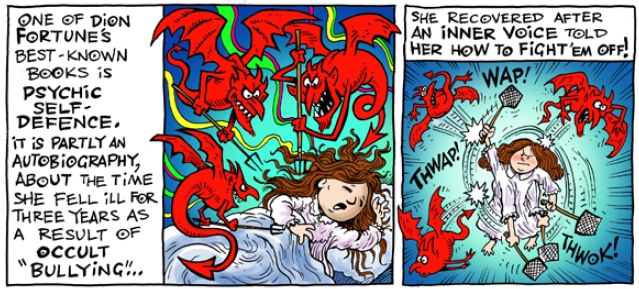
downthetubes: I wanted to ask how you went about injecting humour into strips about occultists, given that some of them cover some quite dark subject matter?
Hunt: I’ve always been known for putting humorous details into things, and the whole thing of doing adaptations of classics. You know, my first adaptation was Lady Chatterley’s Lover, and from then on I’ve always found that you can take a serious subject like those books and find fun in them. I take puns, dreadful puns… in the Ancient Mariner there’s a line that says: “The wedding guest sat on a stone,” so of course I had to have him sitting on Mick Jagger! I mean, it’s a bit corny, a bit obvious, but that’s my sense of humour. So it’s a case of finding those things and pushing them in there wherever and whenever possible.
downthetubes: All right, another aspect of the book is that the occultists know they’re in a comic. So did you break the fourth wall to make light of the darker elements of the strips?
Hunt: My comic characters are always aware that they’re in a comic, and they’re kind of like actors; they know they’re actors, and also they’re not very good actors! [Laughs] So whenever they’re not doing anything they’re standing around picking their nose or something. It’s done for comedic effect, if there’s a chance for a laugh you stick it in there. Laughs are difficult to get, so you take every opportunity you can! [Laughs]
downthetubes: Lives Of The Great Occultists is also full of sight gags, puns and irreverent asides. So why did you incorporate them into your occult strips when your Ruskin and Inferno books had relied more on conversational humour?
Hunt: The Ruskin and Inferno books had the perfect thing for comics, which is two characters, because you can then get the plot going forward by having the characters explain things to each other rather than having continual explanation panels. And then because the characters are talking to each other it gets conversational, and the conversations tend to drift away from the point, and they’ll get into arguments and things. It’s like life.
downthetubes: I guess there were a lot of historical figures who would have been interesting to cover but for whatever reason didn’t make the cut?
Hunt: I had to say to Kevin in the end: “That’s enough,”:and he was still coming back and saying: “What about another one? How about this?” I had to say: “No, no. We’re finished now.”
downthetubes: And I guess there were only so many pages you could persuade Fortean Times to give you.
Hunt: It’s only a page a month, but if you’re dragging something out over four months that’s actually enough, because there must be quite a few people just pick the magazine up occasionally, and you don’t want them to be always finding themselves in the middle of something.
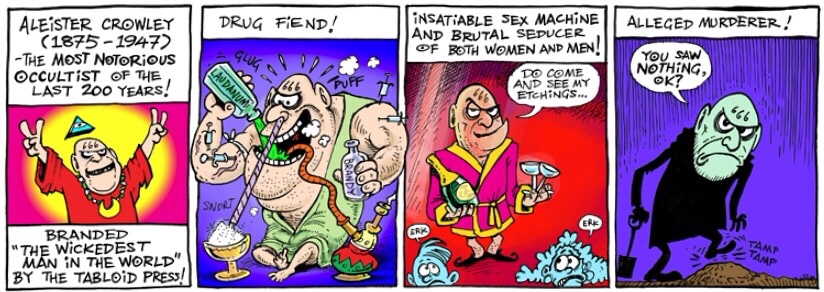
downthetubes: One occultist features far more heavily in the book than the others. So how did Aleister Crowley become both a comedy turn and the de facto star of Lives Of The Great Occultists?
Hunt: [Laughs] He’s there all the time! Through the 20th Century anybody who was involved in the occult seems to have come across him at some point or other. I think because there’s so much material about him it’s kind of obvious. Also, whenever I mention to people that I’m doing Great Occultists everybody says: “Oh, Aleister Crowley!” It’s the only one that people have ever heard of, mostly. So it was inevitable that he was going to get quite a lot of the book, and he was a very entertaining character, really.
Kevin: My take on Crowley … a lot of people regard him as a seriously evil and powerful and dangerous person, but I think that’s hogwash. I think he was a prankster, I think he was utterly self deceived about his genius as a poet, as a painter and in general. But I think he was the 20th century’s arch trickster. Most cultures at one time or another throw up a figure who is known to anthropologists as the Trickster. The Trickster is somebody who basically puts sand in the Vaseline, you know, he or she goes around playing pranks, spreading hoaxes and disrupting the normal flow of life. And that’s a reason why I’m interested in him, even though his writing is unbelievably dull and he probably wouldn’t have been very pleasant to hang out with. None the less, at a distance he’s a very amusing spectacle.
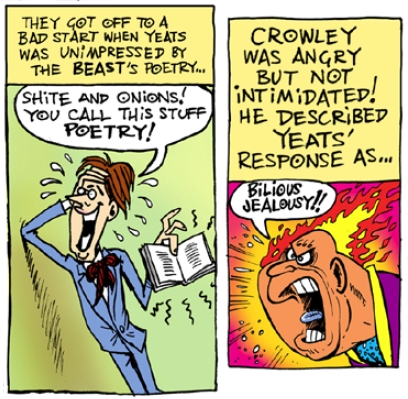
downthetubes: Did he develop as a character, almost?
Hunt: Yes. He does develop as a character. That tends to happen. If you have to do a character quite a few times they do take on their own life. Crowley, he’s kind of got this reputation of being the ‘Great Beast’ and turning up everywhere. That gives you a jumping off point to start with, but I think that he was a lot more knowing in what he was doing.
downthetubes: Do you mean that he took himself less seriously than some other people did?
Hunt: I’m sure he did, yes. It’s odd the way that through the middle of the 20th Century spiritualism and occultism do seem to have taken peoples’ minds somehow. I think the fact that the First World War had wiped out a generation meant people were trying to find out why the hell this terrible thing had happened to them, what had gone wrong. So somebody like Maya Deren, who was an independent film maker, she spent time in Haiti and made an important documentary film about the country. While she was there she got to know about voodoo, and ended up as a voodoo priestess. Did she believe in it? I don’t know. She was an intelligent woman, a modern woman, and yet she got involved in all that. Maybe drugs have something to do with it as well! [Laughs]
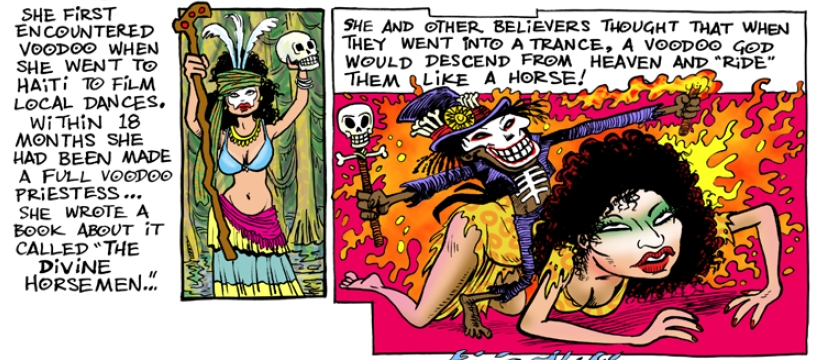
downthetubes: Sticking with Crowley, why do you think that there’s an ongoing fascination with him, and his weird and wonderful life?
Kevin: I think there are a lot of people out there in suburbia, living in their mother’s basements, who fantasise about being warlocks and slapping spells on people and stuff. Crowley is also a big figure in Heavy Metal and so forth – didn’t Black Sabbath do a Mr. Crowley track? Also, David Bowie made lots and lots of references to Crowley.
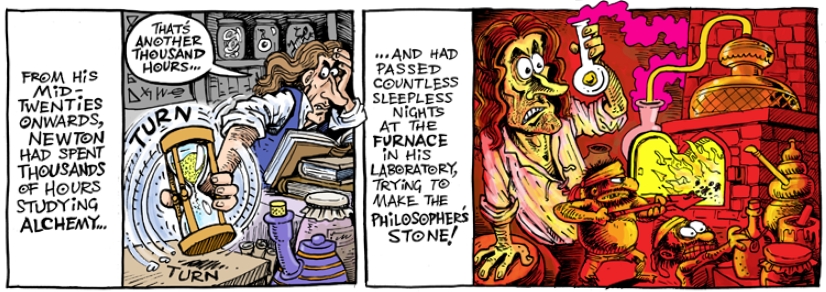
downthetubes: If I ask about a couple of other occultists in the book. I was surprised to see Sir Isaac Newton included.
Kevin: One of the things that I don’t think is mentioned in the comic strip is that Isaac Newton had control of the Royal Mint for a number of years at the end of his life. [John Maynard] Keynes, the great economist, was for that reason fascinated by Newton, and at a sale at Sotheby’s in the 1930s he managed to buy for next to nothing a whole load of manuscripts about Newton’s research that no one had taken any interest in because they weren’t to do with physics. They were all to do with alchemy or biblical prophecies or divining the future. So Keynes wrote this utterly brilliant, quite short essay saying that Newton was the first of the modern scientists, but also the last of the great magicians. I just thought that it was such a brilliant phrase that it stuck in my head for 25 years.
downthetubes: So it could have all been viewed as science at the time?
Kevin: Exactly. Again, John Dee – who’s now remembered as a magician – was a brilliant mathematician, he was a brilliant geographer and he drew up navigation charts for the expanding Elizabethan navy. He was a crucial figure in Britain’s rise in maritime power. A lot of what he knew we now regard as science, and a lot of what he knew we now regard as phooey. But for him there was no intellectual distinction.
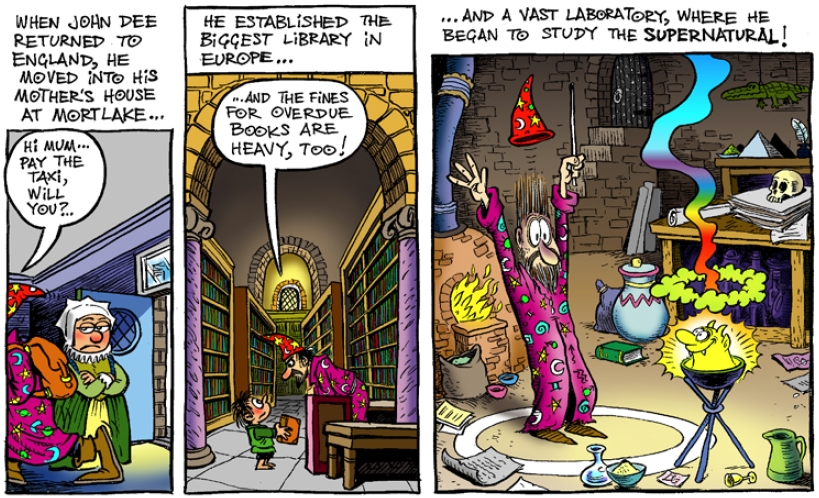
downthetubes: All right, if I can ask about Faust. I wondered why you based your Faust strip on a fictional account rather than on historical documents or records of the real person?
Kevin: One of my great intellectual heroes William Empson did a tremendous amount of work on Marlowe’s version of the Faust legend, which is Dr. Faustus, and he looked into the development of the mythology. It begins with the Faust-Book, which laid the foundation for all subsequent dramatic treatments of the myth, but the heart of it was purported to be reportage.
downthetubes: I was hoping you might say that the fictional account was more amusing.
Hunt: I’m sure that’s the case! [Laughs] But Faust is quite an interesting one in that it’s a character that’s entered the canon of literature. He was written about, and turned into a fictional character – and he continues to be so. Where as somebody like Victoria Woodhall, nobody has ever heard of.
downthetubes: Well, yeah. So how did Victoria Woodhall go from pauper to psychic to presidential candidate?
Hunt: [Laughs] I don’t know, I’d have to have a look at the comic again! [More laughter]
downthetubes: It’s interesting though, you can’t really imagine a current US presidential candidate admitting that they used to be a psychic.
Hunt: [Laughs] I think it’s not so unbelievable now with all of the conspiracy theories they have, you know, and the fact that evangelicals in the United States are so powerful. I mean, they’re just a step away from psychics. And when you look at the conspiracy theories, QAnon, all of that stuff, and the Anti Vaxxers, the same ones that believe that 5G masts spread Covid-19 and that Bill Gates is planning to inject everybody with microchips. This stuff is becoming more and more important in American politics; it’s very frightening, actually. There are more and more people in the States that are ready to believe this stuff rather than the truth. It’s crazy.
downthetubes: Carl Jung is another interesting figure in the book, but he’s better known for advancing the field of psychology.
Hunt: It’s all part of the development of it. Looking for explanations for schizophrenia, for example. If you don’t know about brain chemistry, possession is as credible an idea as anything else. Carl Jung has his theories about psychology, and that went into the idea that we have archetypes inside us that are cultural, which is not that far from occultism and belief in spirits.
downthetubes: So would you even say that the occult was necessary to the development of mental health care – at least in terms of the occultists in the book?
Hunt: Quite possibly, yes. In as much as it gave them a framework to think about things, to try and work out theories. I mean, phrenology, the idea that the shape of a skull can tell you what kind of character traits people have. The guy who invented that, he had his own proof for it as well, and until it’s disproved it’s as legitimate as any other idea.
downthetubes: I guess so, and I guess Freud disagrees with Jung in the book.
Hunt: Yeah.
downthetubes: So Freud went with what he thought was a scientific route and left Jung to go his occultist route, but you could argue that Jung’s theories are more respected these days than Freud’s.
Hunt: I would think so, yes. But, again, you see Freud was scientific, yes, but he seemed to place an awful lot of importance on hysteria, without understanding what hysteria was about, you know? That was still close to possession, which runs back very quickly through history to the idea of Jesus driving the mad spirits out of people and into pigs. It’s all trying to find explanations for stuff that they didn’t know anything about, really.
downthetubes: I was also curious about Austin Osman Spare.
Kevin: I like the fact that he’s a working class hero. He was a cockney and he never lost his accent, and he was just a wonderful eccentric. He was also very talented. I think I mentioned in the strip that he had his first picture shown when he was only 17. He claimed that Hitler had commissioned a portrait from him on the strength of having seen some of his work reproduced in a newspaper. Now whether Hitler actually did this or not is irrelevant because Austin Osman Spare told everybody that he had. I’m also a bit of a cat fancier, so I love the fact that his chief joy and delight in life was looking after cats. Hunt drew some wonderful grinning cat faces in that strip.
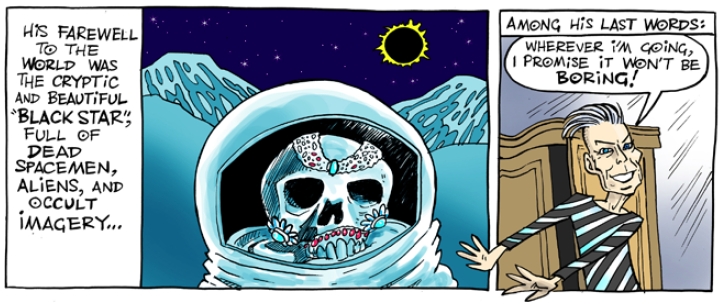
downthetubes: That’s true! So if I mention one last occultist: David Bowie.
Hunt: David Bowie died, and Kevin just rang up and said: ‘You know he was involved as well? Why don’t we do David Bowie?’ He was one of the very last ones we did, if not the last one. We just thought: ‘Yeah, we might as well, seeing as the man’s just died.’ A lot of his occult belief was down to cocaine! [Laughs] But he kept the trappings of the beliefs around him right to the end – the Kabbalah, and that sort of thing. That was all in his last album.
Kevin: It was very interesting, I’ve never cried at the death of any celebrity – apart from David Bowie. I think it was because he was such a big part of my life.
downthetubes: I did wonder if you intentionally ended the book with Bowie?
Kevin: It was just that that’s more or less where we finished. Hunt and I had a discussion about whether we should go on doing them. But I sort of felt we had hit all of the big names, and that it was probably time to stop.
downthetubes: So ending with Bowie wasn’t a nod to the reader that the occult is something that we’ve moved on from and that it perhaps died out with Bowie?
Kevin: That’s an extraordinarily interesting thought that hadn’t occurred to me! But no, it’s just that the topics of the book broadly speaking go from the 16th century to the 21st century in approximately that order.
Hunt: I think we had also decided it was best to stick to dead people. You never know what the living are going to do! [Laughs]
downthetubes: [Laughs] Do you mean little dolls and pins and ouija boards?
Hunt: Yes.
downthetubes: I suppose the other thing is that if you put a story about an occultist that’s still alive in a book you could be up in court!
Hunt: You could be, yeah, or you could find yourself cursed. I think I’d rather be cursed than up in court!
downthetubes: If there’s any difference!
Hunt: [Laughs]
downthetubes: If I ask about the delays that stopped Lives Of The Great Occultists from coming out sooner. What was the story there?
Hunt: I’d done the very last correction that was needed in the book to make it ready for printing, and then we had the lockdown. [Laughs] So we just had to put the brakes on things immediately while we figured out what to do. We talked about it with Tony at Knockabout, and in the end we decided: “We’ve got this book, let’s just publish it, and see how it goes.” So now we’ve got to flog the things, which is always the difficult bit.
downthetubes: Ok, then if I wrap things up by asking why people should pick up a copy of Lives Of The Great Occultists, and also where they can get it?
Hunt: Why they should pick it up? Well, it’s funny! [Laughs]
Kevin: I think it’s very funny! If you don’t laugh at it you should go and see a doctor – or a voodoo priest! I think it provides quite an astounding amount of information about the history of the occult in completely palatable terms, and we didn’t make anything up, we just did mad riffs on established facts. So in other words, for anyone who wanted to find out about the occult it probably is the most exhaustive primer that there’s ever been.
Hunt: There is a lot of it. As to where, they can buy them from me. So that’s largecow.com, and there’s knockaboutcomics.com as well – they can buy them through Knockabout. It’ll also go through the usual distributors, to bookshops, Internet retailers and so on.
Our thanks to Kevin and Hunt for the interview. Now stop dawdling and go and buy the book!
• Lives Of The Great Occultists is available from Hunt Emerson’s “Large Cow” site here | It’s also available from all good bookshops, and AmazonUK here, except you don’t get a free demon*
• Hunt Emerson is online at largecow.com | Lakes International Comic Art Festival Comics Clock Tower
Rory Milne has been a freelance writer for the award-winning games magazine Retro Gamer since 2011, he contributed to the final issue of GamesTM in 2018 and he has recently decided to write about his first love, comics. He can be contacted on Twitter at @Rory_S_Milne or Facebook at facebook.com/rory.milne.writer
* A lie. Sorry.
One of many guest posts for downthetubes.
Categories: downthetubes News
 Crowdfunding Spotlight: Paragon #34
Crowdfunding Spotlight: Paragon #34  FML, new creator-owned series from Kelly Sue DeConnick and David López, promoted with ingenious guerrilla marketing
FML, new creator-owned series from Kelly Sue DeConnick and David López, promoted with ingenious guerrilla marketing  Dark Horse, Hasbro, tease new Dungeons & Dragons, Magic: The Gathering projects
Dark Horse, Hasbro, tease new Dungeons & Dragons, Magic: The Gathering projects  The SEQUENT’ULL Interviews: Dan White
The SEQUENT’ULL Interviews: Dan White